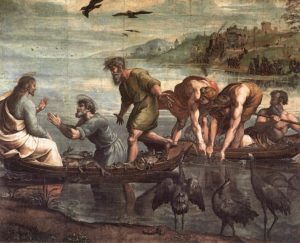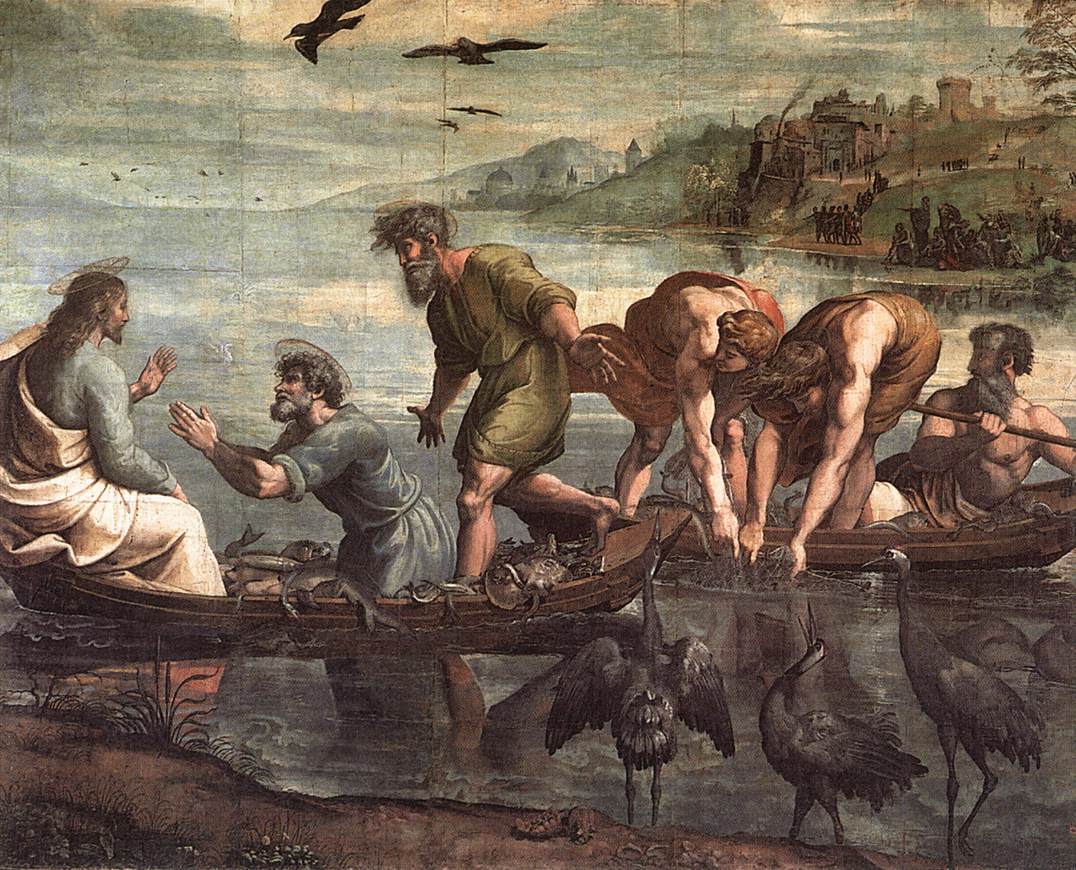
Thank you to Fr. Brian Alford, of the Diocese of Springfield in Illinois, for permission to post his homily delivered on the Feast of St. Josemaría Escrivá, at the Cathedral of the Immaculate Conception, on June 26, 2018.
“Do not be afraid.” (Lk 5:10)
These are the words Jesus says to His Apostles after the remarkable catch of fish that we hear about in today’s Gospel. The Lord would repeat these words on more than one occasion in the Gospels in those moments when people were confronted with His remarkable power in the face of their weaknesses. Witnessing such deeds would elicit an initial reaction of fear, but it was not His desire for people to be afraid of Him, thus those constant invitations: “Do not be afraid.”
“Do not be afraid.”
These are words that we heard spoken time and again by our late Holy Father, Pope Saint John Paul II. At the very beginning of his pontificate, he encouraged the Church throughout the world with these words: “Do not be afraid. Open wide the doors for Christ.”[1] In one of his last published addressed before his passing to eternal life, the Holy Father once again invited the young people of the world: “Do not be afraid.”[2]
“Do not be afraid.”
These are words that we also heard spoken on many occasions by the saint whose feast day we celebrate today. In many of his writings, Saint Josemaría would reference these words, often in their Latin form: “Ne timeas!” He used these words to address both his fears and those of the people with whom he came into contact. On one occasion after a profound experience at Mass, one that would help define a major feature of the Work, he recounts in his Intimate Notes the following: “Normally, in the presence of supernatural events, I am afraid. Afterwards comes the Ne timeas! (Luke 1:30) ‘Do not be afraid: it is I’.”[3]
I have no doubt that this confidence in the face of his fears was the result of his deep understanding of his divine filiation, being a child of God, something our second reading highlights so beautifully: “For you did not receive a spirit of slavery to fall back into fear, but you received a Spirit of adoption, through whom we cry, ‘Abba, Father!’” (Romans 8:15). By virtue of our Baptism, each and every one of us is brought into this intimate relationship with the Lord. And when we truly embrace this fundamental identity of who we are as His beloved children, we too can face all fears with the peace of soul exhibited by the likes of Saint Josemaría and Pope Saint John Paul II.
As he writes in The Forge regarding how to address our fears, Saint Josemaría concludes simply: “The solution is to love.”[4] As His beloved children, we are called to love the Lord “with all your heart, with all your soul, and with all your mind.” (Matthew 22:37) When we live with that constant awareness of being His children, we cannot help but live in that divine love which guards us from the paralyzing effects of fear, for as St. John reminds us: “There is no fear in love, but perfect love drives out fear.” (1 John 4:18)
With those fears cast aside, we can boldly approach God our Father, confident that He will hear us and answer us according to His most perfect and loving will for us. Such boldness was demonstrated on countless occasions by Saint Josemaría, but one in particular comes to mind. It comes from an account of a person who witnessed this boldness during a meditation that Saint Josemaría gave in August 1941 in Madrid. After speaking about having an unshakable confidence in God, he said the following:
“Afraid?” he said. “I’m not afraid of anyone! Not even of God, because he is my Father.” He turned and looked at the tabernacle, and added, as if speaking directly to someone there in the same room, “Lord, we’re not afraid of you, because we love you.”[5]
In addition to being liberated from the fears that confront us, our divine filiation leads us to walk through life with a profound sense of joy. This was another characteristic that defined the life and teaching of Saint Josemaría. While one’s first impression may have been to see him as reserved and unemotional, he was a man of profound joy and was well know for his sense of humor.
A little over a month ago, I had the privilege of celebrating Mass at the Altar of Saint Josemaría in the Prelatic Church of the Work in Rome. After Mass, a young man from Kenya graciously gave us a tour, explaining many of the details of the various chapels throughout the church. When we went down to the crypt where Saint Josemaría was initially buried, and where his two successors, Blessed Alvaro del Portillo and Bishop Javier Echevarría, are currently buried, he shared a story with us about the early days of the church. Saint Josemaría had picked out this location for his final resting place and had one of the workers with him as they examined the space. He told the worker to stand in the center of the room and to jump up and down a few times. Puzzled at the request, but obedient to it, he did so. He then asked Saint Josemaría why he wanted him to do it. He replied that he should take the opportunity to do so now, because the members of the Work probably would not let him do that after his body was buried under that spot. This is but one example of the joyfulness and childlike attitude that resulted from his constant awareness of being a son of God, loved deeply by God the Father.
As we celebrate this feast day of Saint Josemaría, we too are invited to embrace anew our identity as God’s beloved children. And as His children, we can have great confidence that He will provide for all that we could ever need, journeying through the ups and downs of life without fear, but with a profound trust in His merciful love for us, His children. Constantly living in that love which drives out all fear, we begin, already here and now, to “share in the glorious freedom of the children of God.” (Romans 8:21) All that remains, then, is to walk with joy and childlike simplicity with that awareness that we are loved deeply and watched over by our loving Father every step of the way as we continue to advance toward our final home in the Kingdom of God.
So let’s take the opportunity on this feast day to renew many times, in our hearts, that awareness of our divine filiation, especially when faced with fear, so that we will soon hear that Ne timeas, do not be afraid!
[1]Pope Saint John Paul II, Homily of His Holiness John Paul II for the Inauguration of his Pontificate, October 22, 1978. Available at https://w2.vatican.va/content/john-paul-ii/en/homilies/1978/documents/hf_jp-ii_hom_19781022_inizio-pontificato.html
[2]Pope Saint John Paul II, Angelus for Palm Sunday, March 20, 2005. Available at https://w2.vatican.va/content/john-paul-ii/en/angelus/2005/documents/hf_jp-ii_ang_20050320_palm-sunday.html
[3]Saint Josemaría Escrivá, Intimate Notes, no. 217.
[4]Saint Josemaría Escrivá, The Forge, no. 260.
[5]Pilar Urbano, The Man of Villa Tevere: St. Josemaría Escrivá: His Years in Rome (New York, Scepter Publishers, Inc., 2011), p. 40.

Leave a Reply